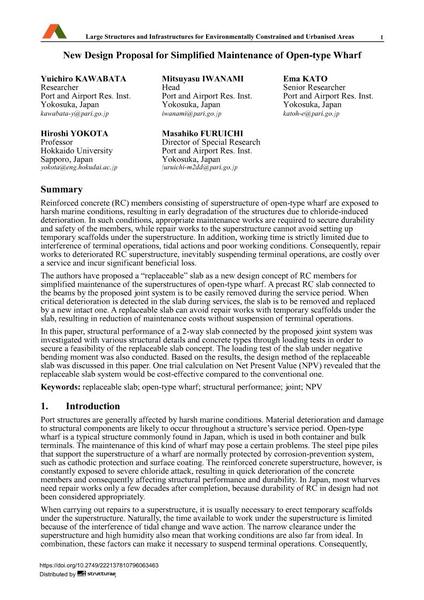New Design Proposal for Simplified Maintenance of Open-type Wharf

|
|
|||||||||||
Détails bibliographiques
| Auteur(s): |
Yuichiro Kawabata
Mitsuyasu Iwanami Ema Kato Hiroshi Yokota Masahiko Furuichi |
||||
|---|---|---|---|---|---|
| Médium: | papier de conférence | ||||
| Langue(s): | anglais | ||||
| Conférence: | IABSE Symposium: Large Structures and Infrastructures for Environmentally Constrained and Urbanised Areas, Venice, Italy, 22-24 September 2010 | ||||
| Publié dans: | IABSE Symposium Venice 2010 | ||||
|
|||||
| Page(s): | 718-719 | ||||
| Nombre total de pages (du PDF): | 8 | ||||
| Année: | 2010 | ||||
| DOI: | 10.2749/222137810796063463 | ||||
| Abstrait: |
Reinforced concrete (RC) members consisting of superstructure of open-type wharf are exposed to harsh marine conditions, resulting in early degradation of the structures due to chloride-induced deterioration. In such conditions, appropriate maintenance works are required to secure durability and safety of the members, while repair works to the superstructure cannot avoid setting up temporary scaffolds under the superstructure. In addition, working time is strictly limited due to interference of terminal operations, tidal actions and poor working conditions. Consequently, repair works to deteriorated RC superstructure, inevitably suspending terminal operations, are costly over a service and incur significant beneficial loss. The authors have proposed a “replaceable” slab as a new design concept of RC members for simplified maintenance of the superstructures of open-type wharf. A precast RC slab connected to the beams by the proposed joint system is to be easily removed during the service period. When critical deterioration is detected in the slab during services, the slab is to be removed and replaced by a new intact one. A replaceable slab can avoid repair works with temporary scaffolds under the slab, resulting in reduction of maintenance costs without suspension of terminal operations. In this paper, structural performance of a 2-way slab connected by the proposed joint system was investigated with various structural details and concrete types through loading tests in order to secure a feasibility of the replaceable slab concept. The loading test of the slab under negative bending moment was also conducted. Based on the results, the design method of the replaceable slab was discussed in this paper. One trial calculation on Net Present Value (NPV) revealed that the replaceable slab system would be cost-effective compared to the conventional one. |
||||
